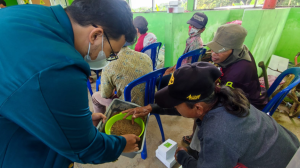Semarang–One of the big problems in many developing countries is organic waste, and Indonesia is no exception. Every day the garbage produced by the community is getting bigger, but the current action is still using the method of dumping garbage in the Final Processing Site (TPA). According to the 2010 Assessment and Application of Technology, the percentage of organic waste reached 65.05%. Therefore, it is necessary to take other actions in processing the organic waste.
Maggot is the larva of the Black Soldier Fly. Maggot is commonly used for animal feed purposes. Maggot contains 43.42% protein, 17.24% fat, 18.82% crude fiber, 8.70% ash and 10.79% water, so it can be used as an alternative animal feed protein. Not only that, but maggot also has the ability to degrade waste. organic matter better than other insects. Kasgot is the result of bioconvection residues of organic waste, where cassava has the benefit of being compost.

From these observations, several TRKI lecturers held training on organic waste processing using maggot media in the Resik Sejahtera Waste Bank community, Polaman Village, Mijen District, Semarang Regency. This is in line with the realization of Sustainable Development Goals (SDGs) number 11, namely “Sustainable Cities and Communities”. M. Endy Yulianto, ST., MT, TRKI Undip lecturer representing the team revealed that increasing knowledge and skills regarding organic waste processing using maggot media can reduce animal feed costs, reduce vegetable compost costs and increase the income of community members and the people of Polaman Village.
Haryono, Head of the Resik Sejahtera Waste Bank explained that previously the residents of Polaman Village had processed waste. However, they have not been able to process organic waste, especially using BSF larvae. Therefore, with the training, it is very helpful for Polaman Village residents in processing organic waste to the maximum and can reduce the cost of animal feed.


Recent Comments